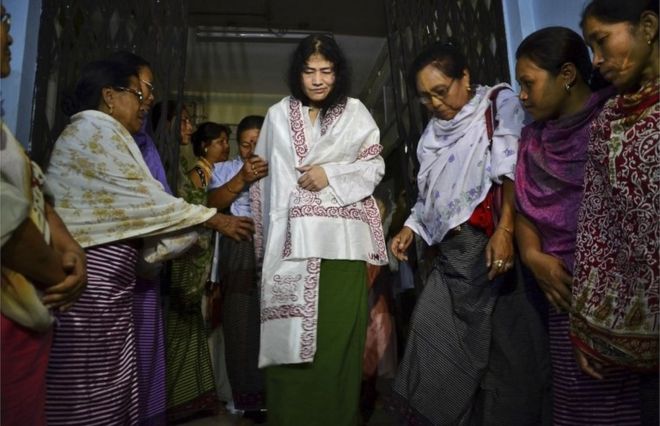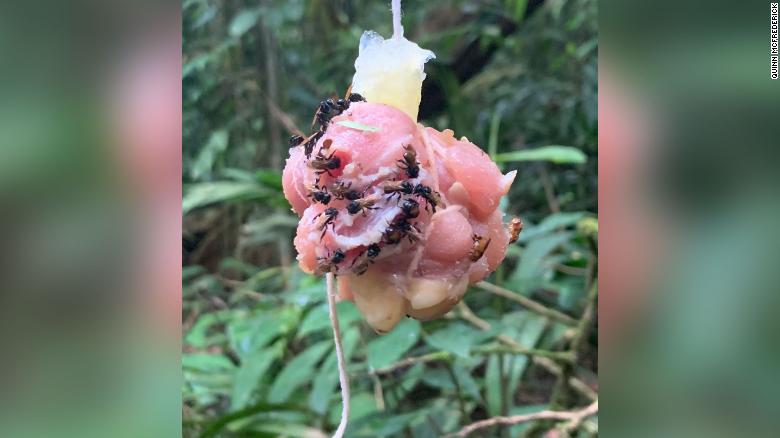

“Don’t make me a goddess. I am an ordinary woman with ordinary desires,” Irom Sharmila, seen as the world’s longest hunger striker, once told an associate.
“I want to eat good food, get married, want to have children. Please don’t put me on a pedestal. I am just an ordinary person engaged in an extraordinary struggle.”
Her struggle has been against India’s notorious Armed Forces Special Powers Act, a draconian law which gives the security forces sweeping powers to arrest people without warrants and even shoot to kill in certain situations.
Amnesty International says the law “provides impunity for perpetrators of grave human rights violations, including extrajudicial executions, enforced disappearances, rape, torture and excessive use of force” in Manipur, Ms Sharmila’s troubled homeland.
One grim example: in July, India’s Supreme Court asked a local rights group to give details of 1,528 alleged extra-judicial executions by security forces in the state between 1979 and 2012.
Ms Sharmila has spent 16 years in a hospital room, surrounded by armed guards and a team of doctors and nurses who would force-feed her liquid nutrients and medicines nasally through pipes, sometimes up to three times a day.
This for a woman who described her favourite curries to a biographer: they included a local one made with fermented soya bean, vegetables, roots and water plant.
On Tuesday, she finally broke her fast by tasting some honey at an emotional meeting with the media.
 Image copyrightREUTERS
Image copyrightREUTERSFor somebody who became such a powerful symbol of non-violent protest, Ms Sharmila had an unremarkable early life. The youngest of nine children of a government worker and a homemaker mother, she struggled to complete school and never went to college.
She learnt shorthand, typing and tailoring, worked in a school for the blind and signed up for journalism classes.
She learnt yoga. Her friends say she wrote lots of prose and poetry. “She had many friends but she kept aloof. A brooding intensity kept her apart,” says her biographer Deepti Priya Mehrotra.
Ms Sharmila worked as an intern with a human rights group in the capital, Imphal, for a couple of months, visiting newspaper offices to collect information on atrocities committed by security forces in Manipur. Her colleagues remember her as a quiet and composed woman, who never missed a day at work.

The young intern dressed simply, hardly combed her hair, never wore makeup, and drifted in and out of her workplace with a quiet dignity. She unfailingly attended every meeting called by civil rights group, prompting a researcher to ask one of her close friends, “I see her everywhere. Is she a spy?”
Poring over papers containing details of a horrific incident of a woman who was allegedly gang-raped by security forces in front of her father-in-law left her profoundly shaken. “I get nightmares when I think about it,” she told her friends.
The nightmare edged closer home when on 2 November 2000, security forces gunned down 10 civilians near a bus stop on a highway near Imphal after an explosion hit a paramilitary convoy, injuring two soldiers.
Important mission
An arched gateway leading to a memorial in a tiny, grassy enclosure and an abandoned bus stand in Malom, the site of the killings, are stark reminders of the tragedy that changed Ms Sharmila’s life. “In the loving memory of 10 innocent lives,” says a plaque.
They included a 17-year-old high school student who had won a national bravery award for saving his brother from drowning and a 60-year-old grandmother. A judicial enquiry more than a decade later found that all the victims were “innocent persons”.
Three days after the incident, Ms Sharmila cycled up to the home of her friend and fellow human rights activist Babloo Loitongbam and told him she was going on a hunger strike if the draconian law was not revoked. “She said she had told her mother that she was leaving home on an important mission. She said she wouldn’t break her resolve if the law was not lifted,” says Mr Loitongbam.

 Image copyrightAFP
Image copyrightAFPShe didn’t. She hung up a sign and began her hunger strike on a main road. Then she was arrested under an inept Indian law that makes trying to take your own life a crime.
For the next 16 years, Ms Sharmila, interred in a hospital room, fasted in isolation. Once a year – the maximum sentence for an attempted suicide is one year – she would be released by the courts and re-arrested within days as she would usually retire to a shed near the hospital and continue her fast.
Falling in love
A struggle forged in the desolation of a hospital room turned out to be oppressive. In some of Ms Sharmila’s early poems, say her friends, there is a deep sense of foreboding: she wrote about death.
Her menstrual cycles became irregular, and she had minor surgery to drain some fluid from her chin. She even stopped brushing her teeth. At other times, she just sounded plain despondent. “I have been living alone for a long time, in solitary confinement. I was like a hollow bamboo. I was empty,” she told her biographer.
But Ms Sharmila is nothing if not tenacious. She read religious texts and wrote furiously on her laptop. Much later she began enjoying Stieg Larsson thrillers.
 Image copyrightAFP
Image copyrightAFPTo keep herself fit, she did yoga, sometimes up to five hours a day. She took an early morning walk in a small garden outside her ward. She grew flowers in pots. And in an unexpected twist in this drab life of a fasting stoic, Ms Sharmila also fell in love with a British man, who proposed to her after an exchange of tender love letters.
On 26 July, in a totally unexpected move, she decided to end her fast and fight elections. The reaction was swift.
‘Not a politician’
Manipur is a bloody, unruly playground for half a dozen outlawed separatist groups, and some 18 other outfits who view India as a colonial power and fight ethnic battles.
Some of these groups have urged her to continue the fast; others have asked her to shun politics; still others have asked her not to marry an outsider – her British fiance – in a state where many natives suffer from a crisis of identity and feel they are being swamped by outsiders.
But in the streets and bazaars of Imphal, people are more sympathetic. They support Ms Sharmila’s decision to end her fast, but don’t want her to join politics.
 Image copyrightAP
Image copyrightAP“She is the most trusted icon of our resistance,” says Nameirakpam Chaobi Devi, who lives in a village in Malom. “But if she joins politics, the trust will be broken. Nobody trusts politicians in Manipur any more.”
Even her associates wonder whether Ms Sharmila is cut out for the rough grind of politics. “I can’t see her as a politician. She’s not a born leader or a strategist,” says Mr Loitongbam. In the past, Ms Sharmila herself has despised politics in her state. “Politicians are not working for the people,” she said once.
“Unbind me/remove this chain of thorns/let me not deflect my course”, she wrote in one of her poems. The “caged bird”, as Ms Sharmila called herself, could now be free soon. And, at 44, the lonely crusader could yet transform herself into a woman of the people.
[Source:- BBC]





